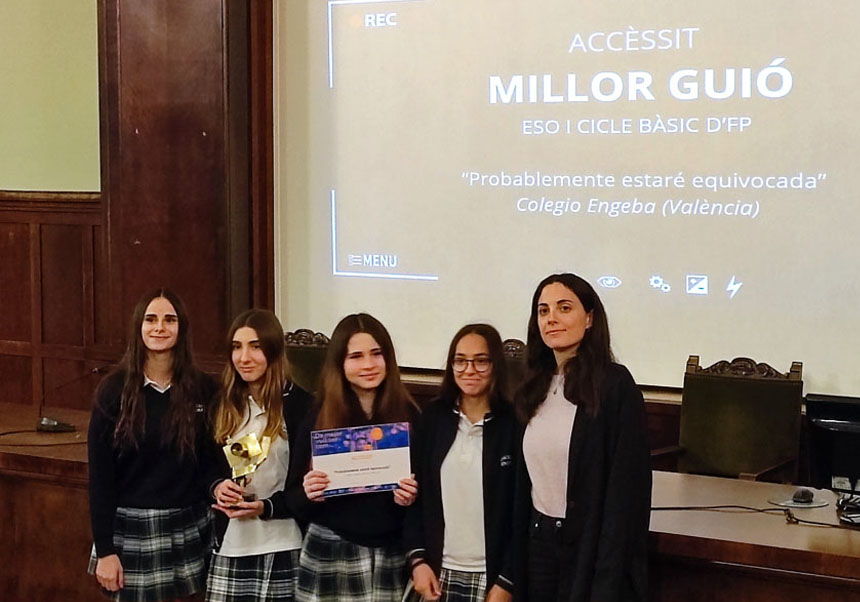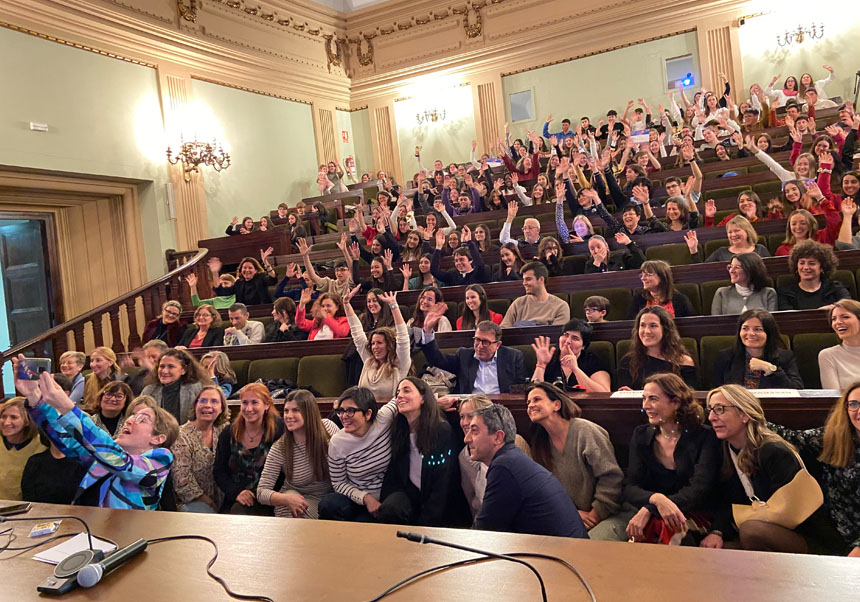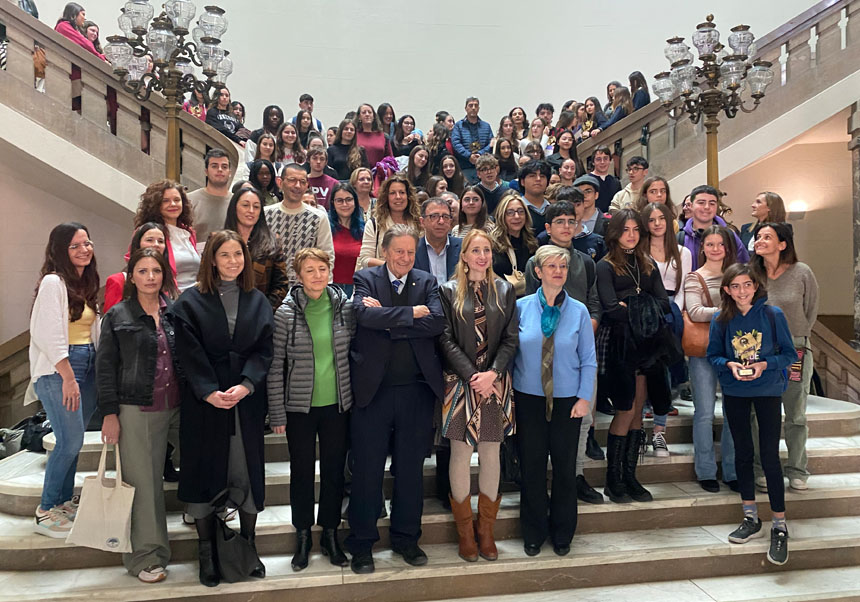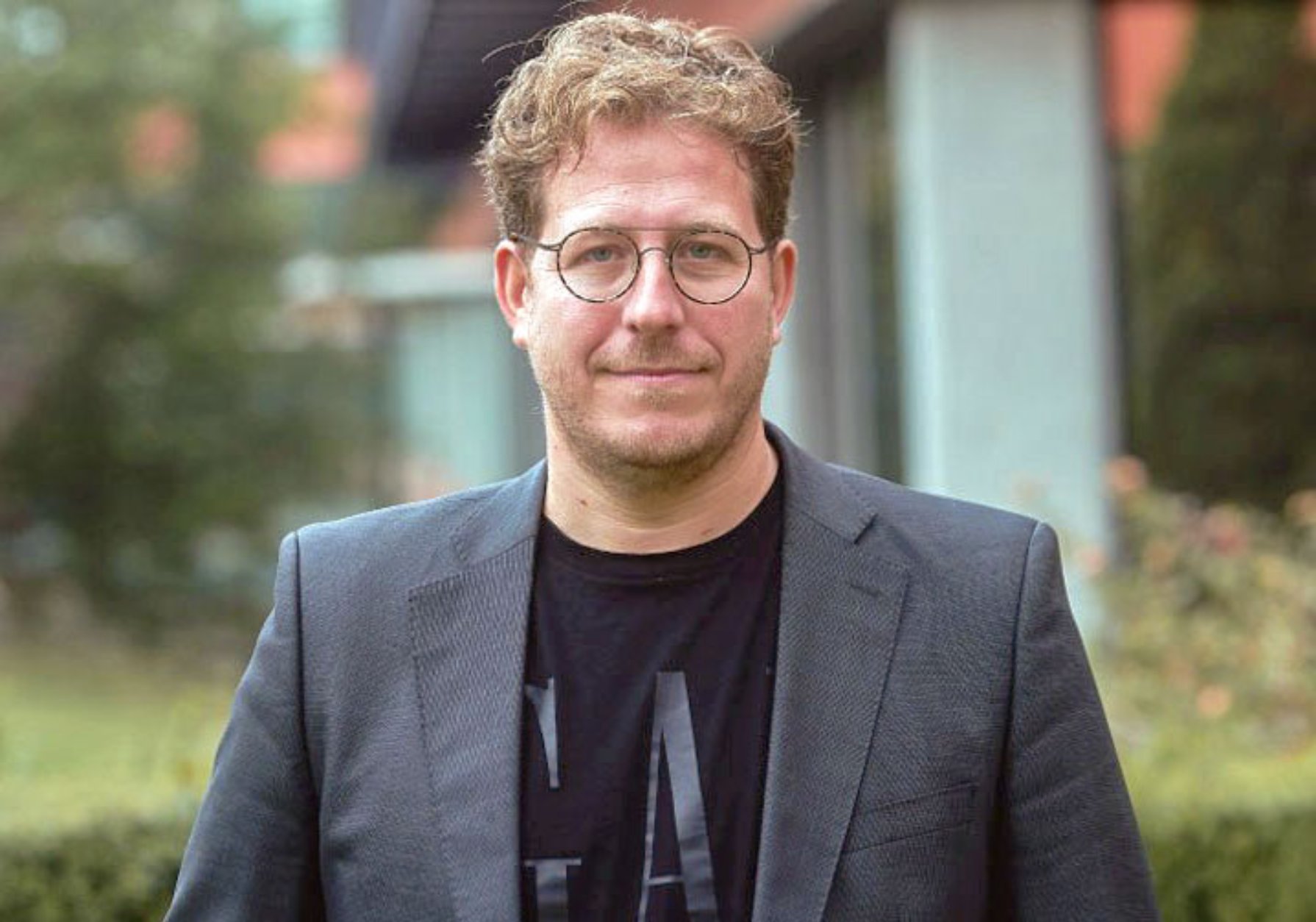Past, present and future of women in science in a contest for pre-university students
- Scientific Culture and Innovation Unit
- March 7th, 2024

“Don’t be afraid to be the first in the class”, said a student from the IES Pere Boïl, a member of the winning team of one of the prizes awarded at the gala awarding the VII edition of the video contest “De major vull ser com…” “You are the scientists of the future”, remarked Sylvia Martínez, vice-rector of Equality, Diversity and Inclusive Policies of the University of Valencia, in this event aimed at students of Compulsory Secondary Education (ESO), Baccalaureate and Vocational Training (FP) and whose objective is to identify and investigate references for women or groups of women in scientific, technological and innovative disciplines.
“Stimulating and encouraging the scientific vocation of young women is the way to build a society in which excellence and talent know no gender limits”, declared Mariola Penadés, general director of Innovation and Research of the Ministry of Health.
“The glass ceiling is a problem that affects not only female scientists but all women in general”, commented a teacher from the IES Blasco Ibáñez of València at the gala, held on March 1 in the UV Rectorate’s Assembly Hall, where the importance of women in science was vindicated for yet another year in the face of the invisibility that they have suffered throughout history by the patriarchal system.
“De major vull ser com…” is a contest that has been organised since 2018 by the University of Valencia together with Fisabio, an organisation dependent on the Valencian Department of Health and which this year has been expanded to other Health centres. Endowed with 16,000 euros, 350 male and female students from 32 Valencian educational centres have participated in this seventh edition, who have contributed 89 videos (a participation record) in which the work of 102 female scientists is vindicated.
In the category of Best Audiovisual Production, the videos “Carta a su hija”, from the IES Pere Boïl in Manises and “Volar”, from the Julio Verne School in Torrent, have been awarded. In the category of Best Screenplay, the works “Mujer tenías que ser”, from the San José y Santa Ana School in Torrent, and “Trenquem el sostre de vidre”, from the IES Blasco Ibáñez in València, have been recognised.
In the Most Innovative Video section for Character Selection, the award went to “Estrellas de oriente”, from the IES Cid Campeador in Valencia, about the pioneering figure in Indian medicine Anandibai Golparao. Also recognised was the video “Gitanjali Rao, a reference scientist for adolescent girls”, from the IES Malilla in Valencia, which documents the invention of the young American, a device to detect the presence of lead in water.
In addition, the winning teams of the two public vote awards were the following: in the ESO and Basic Cycle of Vocational Training modality, they were the video “Las chicas del Eniac” from the IES Canónigo Manchón of Crevillent with 826 votes, while that, for Baccalaureate and intermediate and higher vocational training cycles, the winning video was “Fa uns quants anys…” from the IES Jaume II El Just of Tavernes de la Valldigna (873 votes).
Two secondary prizes have also been awarded to the videos “Probablemente estaré equivocada”, from the Engeba School in València and “Siempre hay referentes”, from the IES Vicent Andrés Estellés in València.

Jury made up by female specialists
The award-winning videos have been selected by a jury made up of female specialists related to science, equality, education, research, creation and culture. They are: Oti Rodríguez, Communication technician at the University of Alicante; Delfina Roca, head of the Scientific Dissemination coordination section of the Scientific Culture and Innovation Unit (UCC+i) of the University of Murcia; and Leonor Goicoechea, equality agent and gender trainer at Associació per la Coeducació.
Representatives of each organising entity are also part of the jury: Patricia Souto, audiovisual technician from the University of Valencia; Andrea Blanco, Fisabio communication technician; Javier Ripoll, coordinator of the Computer Science Area of the La Fe Research Institute; Olga María Rivero, emerging Miguel Servet researcher in the Psychiatry and Neurodegenerative Diseases Research Group of the INCLIVA Health Research Institute; and Ana Tobarra, quality technician at the Alicante Health and Biomedical Research Institute. In addition, the gala was hosted by Helena González Burón, from Big Van Ciencia.
The contest
In the organisation of the “De major vull ser com…” contest, apart from the University of Valencia, the Ministry of Health participates with the following entities: the Foundation for the Promotion of Health and Biomedical Research (Fisabio), the Institute of Health and Biomedical Research of Alicante (ISABIAL), the Health Research Institute of La Fe (IIS La Fe) and the INCLIVA Health Research Institute.
The objectives of the contest are, mainly, to recognise the key role in scientific and technological disciplines that women have played in the past and play in the present, to make visible the impact that patriarchy has produced in the lives of these women scientists and in their professional trajectories, promote the awakening of scientific and technological vocations among girls and adolescents, and contribute to equality education, highlighting their findings and their contribution to the well-being of citizens.
The mechanics consisted of recording a 3 minutes maximum video showing the scientific and/or technological contribution of a woman and/or a group of women. This call is open to all secondary, high school and vocational training students from any educational institution in the Valencian Community.
The videos had to deal with one of the following topics, according to the contest rules: historical figures notable for their discoveries or inventions, or women who are currently also an academic, personal, community, professional or even political reference. The clip must explain the relevance of the chosen figure and how it has contributed or contributes to the well-being of society.
The financial prize for this seventh edition is given both to the students who made the videos and to the educational centres from which they come, who allocate them to the acquisition of scientific and technological material.
At the awards ceremony, Javier Quesada, director of the Valencian Foundation for Advanced Studies, member of the European Academy of Sciences and Arts, and executive president of the Rei Jaume I Awards, highlighted the importance of this type of contests: “The financial endowment of the Rei Jaume I awards is invested in science itself: promoting the careers of young people, acquiring equipment and technology... And the motivation of the ‘De major vull ser com...’ contest is to create scientific vocations in the youth of our country and recognise the work of women in science.”
File in: Recerca, innovació i transferència , Institucional , Cultura Científica , Difusió i comunicació científica

















